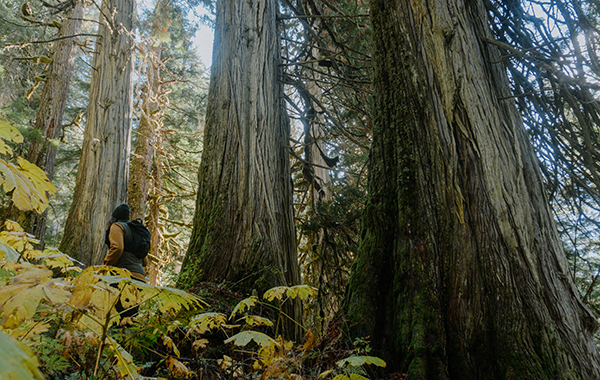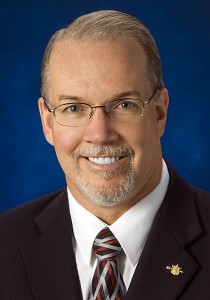Home »

Old-growth deferral announcement elicits differing views
The provincial government Nov. 2 announced its intention to work in partnership with First Nations to defer harvest of ancient, rare and priority large stands of old growth within 2.6 million hectares of B.C.’s most at-risk old-growth forests.

“Forests are a part of who we are as British Columbians. We have a responsibility to ensure the benefits are shared, today and with future generations,” said Premier John Horgan. “Following the recommendations of the Old Growth Strategic Review, we are taking steps to fundamentally transform the way we manage our old-growth forests, lands and resources.”
The announcement was received differently by conservationists and the forest industry.
“Today’s old growth announcement by the B.C. government to defer 2.6 million hectares of forests is extremely concerning to Canfor. If fully implemented, it would have significant impacts on our hard-working employees and their families, along with our Indigenous partners, contractors, communities, and the entire industry,” said Don Kayne, Canfor President and CEO.
“The B.C. forest sector has been negatively impacted by ongoing constraints on the working forest that have eroded the global competitiveness of our industry. Our industry is recognized around the world as a leader in sustainable forest management and we want to continue producing in-demand, low carbon wood products that are helping to address the climate crisis. Today’s old growth announcement will further challenge any opportunities for investment in B.C,” Kayne said.
“We are again asking government to meaningfully engage with Indigenous Nations, forest professionals, local experts and industry to develop a balanced, science-based approach to old growth management.”
Regional conservation group Wildsight said the deferral is a step in the right direction but more needs to be done.
“For the first time in our province’s history we have a provincial government that is recognizing the desperate state of B.C.’s irreplaceable forests and the need to take immediate action to protect old growth. This is a major shift in how the B.C. government views old growth,” said Eddie Petryshen, Wildsight Conservation Specialist.
There is no more time to waste in protecting the last of our old growth forests in this province. Old growth ecosystems like the Inland Temperate Rainforest (ITR) are on the brink of ecosystem collapse, Petryshen said, adding, a peer reviewed scientific publication found that ecosystem collapse in B.C.’s rare Inland Temperate Rainforest is imminent in nine to 18 years if logging rates continue at current levels. The group refers to the ITR as “one of the world’s most imperilled temperate forests.”
A year ago, the government released findings from a provincial old growth strategic review. “A New Future for Old Forests” laid out 14 key recommendations to realize a paradigm shift in old growth management in B.C.
“This is the first step in realizing the paradigm shift in BC forestry called for by the Old Growth Strategic Review that will manage our forests for ecosystem health not timber values,” said Petryshen. “Working in full partnership with Indigenous Nations on old growth deferrals and long-term protections is a major step in the right direction. Words must be turned into action; the time of B.C.’s ‘talk and log’ policy is over.”
Today’s announcement is a promising start but there is much more to do. Further work is required to identify areas on the ground that contain high value old growth that are not shown on the maps or have already been slated for logging, Petryshen said.
“While it is great to see B.C. immediately halt new BC Timber Sales (BCTS) blocks that overlap with the identified most at-risk old growth, Petryshen notes that this should be applied equally to all licensees in B.C.
The announcement does not apply to active cutblocks or already permitted logging blocks.
“It’s essential that the province provide necessary support to workers and rural communities. New approaches will be vital as we make the difficult transition away from the unsustainable harvest of old growth and prioritize managing our forests for ecosystem health.”
The provincial logging deferrals are a temporary measure – recommended by 2020’s Old Growth Strategic Review – to prevent irreversible biodiversity loss while First Nations, the province and other partners develop a new approach to sustainable forest management that prioritizes ecosystem health and community prosperity throughout B.C., a Ministry of Forests, Lands, Natural Resource Operations and Rural Development media release noted.
This new approach will be based on the recommendations provided in the Old Growth Strategic Review and will recognize that a shift to prioritize ecosystem health is necessary if the forests are to continue to provide essential benefits, such as clean air, clean water, carbon storage, conservation of biodiversity and timber.
Details of these forest stands – mapped and defined by a panel of independent scientific and ecological experts – have been shared with First Nations rights and title holders so they can advise how to proceed on the deferral areas within their respective territories.
The province is requesting that First Nations indicate within the next 30 days whether they support the deferrals, require further engagement to incorporate local and Indigenous knowledge, or would prefer to discuss deferrals through existing treaties, agreements and other constructive arrangements. Capacity funding of up to $12.69 million over three years is available to support this process.
To support the deferral process, government will immediately cease advertising and selling BC Timber Sales in the affected areas.

“We’re building a new vision for forest care to better share all the benefits of our forests together, for generations and generations to come,” said Katrine Conroy, Minister of Forests, Lands, Natural Resource Operations and Rural Development. “We are committed to working in partnership with First Nations to make sure we get this right and to supporting workers and communities as we develop a sustainable approach to managing BC’s old-growth forests.”
The province is also bringing together supports to help forest workers, communities and First Nations with the necessary supports to offset job and economic impacts that may follow new harvest restrictions.
Programs will include connecting workers with short-term employment opportunities, education and skills training or funds to bridge to retirement.
The province will also work in partnership with business and communities to develop new supports that will assist rural communities to create jobs through diversified economies, infrastructure projects and innovation in industry.
“When the deferral period ends, the newly identified at-risk forests will either be added to B.C.’s 3.5 million hectares of old-growth forests already off-limits to harvesting, or included within new forest management plans,” the ministry said.
As per the recommendations of the Old Growth Strategic Review, government will work in partnership with First Nations to provide clarity on the areas of forest that should be protected forever, the areas that may support some harvest under strict management conditions that prioritize ecosystem health, and the areas that can be accessed for sustainable timber management to support workers and communities.
The result will be permanent protection for more of B.C.’s most important old growth and more clarity to support investment and jobs.

“A commitment to partnership with First Nations and integrating their perspectives on land is fundamental to facilitating the required paradigm shift in forest management that includes old growth as a key component of ecosystem health,” said Kimberley area resident Garry Merkel, one of five members of the independent technical panel, and co-author of the Old Growth Strategic Review. “Once temporary deferrals are in place for the most at-risk ecosystems, government can turn toward implementation of the remaining recommendations of the strategic review and developing a new path forward.”
“By doing this work, we’re following through with the recommendations from the Old Growth Strategic Review, and our commitment to reconciliation in line with the Declaration on the Rights of Indigenous Peoples Act,” Premier Horgan said.
The province will provide resources to support First Nations in assessing new data and decisions on deferrals and participating in the development of the province’s new approach to sustainable forest management, the forests ministry stated.
“This will allow First Nations and the province to determine if forest carbon offsets could be used to support the protection of old growth. The province will also establish a new process to enable individuals and organizations to donate funds to purchase existing timber licences and preserve old-growth stands.”
Lead image: Inland Temperate Rainforest. Photo by Bailey Repp / Wildsight
e-KNOW







